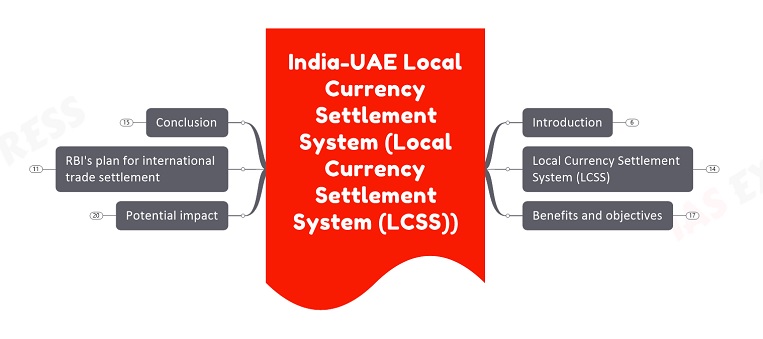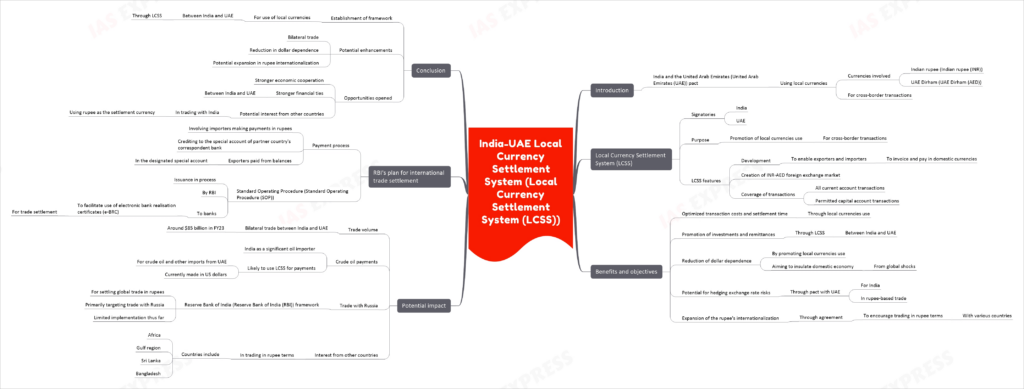India-UAE Local Currency Settlement System (LCSS)

India and the United Arab Emirates (UAE) have signed a pact to promote the use of local currencies, the Indian rupee (INR) and the UAE Dirham (AED), for cross-border transactions. This agreement aims to establish a Local Currency Settlement System (LCSS) that will optimize transaction costs, settlement time, and promote investments and remittances between the two countries.
This topic of “India-UAE Local Currency Settlement System (LCSS)” is important from the perspective of the UPSC IAS Examination, which falls under General Studies Portion.
India-UAE Local Currency Settlement System (LCSS)
- India and the UAE signed an MoU to establish a framework for promoting the use of local currencies for cross-border transactions.
- The Local Currency Settlement System (LCSS) will be developed to enable exporters and importers to invoice and pay in their respective domestic currencies.
- The LCSS aims to create an INR-AED foreign exchange market.
- The system covers all current account transactions and permitted capital account transactions.

Benefits and Objectives
- Optimized transaction costs and settlement time: The use of local currencies will help reduce transaction costs and settlement time, improving the efficiency of cross-border transactions.
- Promotion of investments and remittances: The LCSS will facilitate investments and remittances between India and the UAE, boosting economic ties.
- Reduction of dollar dependence: By promoting the use of local currencies, India aims to reduce its dependence on the US dollar and insulate its domestic economy from global shocks.
- Potential for hedging exchange rate risks: The pact with the UAE may provide a way for India to hedge exchange rate risks in rupee-based trade, limiting losses for Indian exporters.
- Expansion of the rupee’s internationalization: The agreement is part of India’s efforts to internationalize the rupee and encourage trading in rupee terms with various countries.
Potential Impact
- Trade volume: Bilateral trade between India and the UAE reached around $85 billion in FY23.
- Crude oil payments: India, as a significant oil importer, is likely to use the LCSS to pay for crude oil and other imports from the UAE, currently made in US dollars.
- Trade with Russia: The Reserve Bank of India (RBI) had previously announced a framework for settling global trade in rupees, primarily targeting trade with Russia. However, its implementation has been limited thus far.
- Interest from other countries: Apart from Russia, countries in Africa, the Gulf region, Sri Lanka, and Bangladesh have shown interest in trading in rupee terms.
RBI’s Plan for International Trade Settlement
- Payment process: The RBI’s plan involves importers making payments in rupees, which will be credited to the special account of the correspondent bank of the partner country. Exporters will be paid from the balances in the designated special account.
- Standard Operating Procedure (SOP): The RBI is in the process of issuing an SOP to banks to facilitate the use of electronic bank realisation certificates (e-BRC) for trade settlement.
Conclusion
The establishment of a framework for the use of local currencies between India and the UAE through the Local Currency Settlement System (LCSS) will enhance bilateral trade, reduce dollar dependence, and potentially expand the internationalization of the Indian rupee. This agreement opens doors for stronger economic cooperation and financial ties between the two nations, while also setting the stage for potential interest from other countries in trading with India using the rupee as the settlement currency.
Practice Question
- Analyze the significance of the Local Currency Settlement System (LCSS) in reducing dollar dependence and promoting bilateral trade between India and the UAE.


